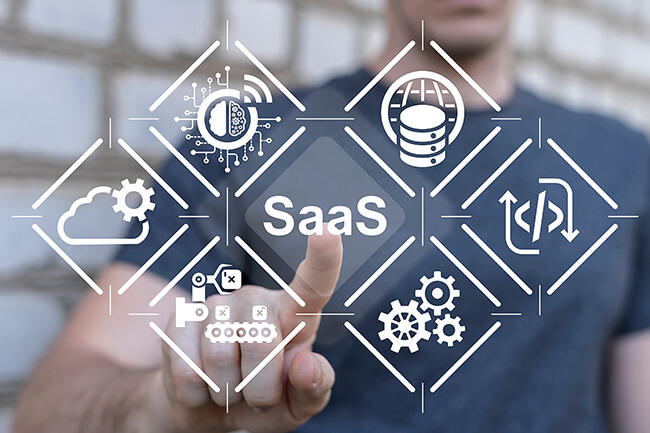In the rapidly evolving tech landscape, Software as a Service (SaaS) enterprises have emerged as frontrunners. These companies provide software solutions through subscription models, delivering unparalleled convenience and adaptability to their clientele.
However, within this highly competitive landscape, successful marketing stands as the linchpin for propelling SaaS enterprises towards growth. Join us in this all-encompassing guide as we traverse the realm of SaaS marketing and developing the ultimate SaaS Marketing Strategy.
We will explore its distinctive features, delve into the art of shaping a victorious marketing strategy, and reveal time-tested marketing techniques that drive undeniable success.
So, let’s embark on this journey to supercharge your SaaS business’s growth!
What is SaaS Marketing?
SaaS marketing is a specialized discipline aimed at promoting software products delivered through the cloud. Unlike traditional software, SaaS relies on ongoing subscriptions, making customer retention and loyalty pivotal. SaaS marketers focus on conveying the value and benefits of their products, often through content-driven strategies, to attract and retain customers.
What Sets SaaS Marketing Apart?
SaaS marketing is unique due to several distinguishing factors:
- Subscription Model: SaaS businesses depend on recurring revenue streams, making customer retention a top priority.
- Continuous Engagement: SaaS customers engage with the product regularly, requiring ongoing communication and support.
- Data-Driven Insights: SaaS companies gather data on user behavior, enabling personalized marketing and product enhancements.
SaaS Marketing By The Numbers
Now, let’s check out some SaaS marketing stats. These numbers paint a pretty impressive picture of what SaaS companies do their marketing in today’s ever-changing digital world.
- Customer Engagement: Over 90% of SaaS companies employ live chat to boost sales, while 89% use it to enhance customer service.
- Budget Allocation: SaaS company marketing budgets typically range from 7% to 8% of their total revenue.
- SaaS Adoption: By the end of 2023, it is projected that over 99% of organizations will have integrated at least one SaaS platform into their operations.
- CRM Evolution: In 2020, SaaS-based CRM software claimed 60% of the CRM software market share.
- Event Marketing: Approximately 16% of SaaS marketing budgets are allocated to event marketing strategies.
- CRM Transition: An anticipated 20% of organizations plan to cease investments in on-premises CRM deployments by 2025, accelerating their shift to SaaS-based CRM solutions.
- Email Marketing Effectiveness: SaaS companies report an impressive average open rate of 66% for their targeted email marketing campaigns.
- Content Marketing Impact: SaaS businesses leveraging content marketing strategies report remarkable lead generation growth, with increases of up to 400%.
How to Create a SaaS Marketing Strategy
- Know Your Audience: Start by understanding your ideal customers. Identify their pain points, needs, and preferences.
- Craft Crystal-Clear Product Messages: Create messaging that vividly showcases your unique value and benefits.
- Master the Art of Content: Create valuable content that educates, informs, and engages your audience.
- Supercharge SEO: Optimize your website and content for search engines. This can be done by using the relevant keywords to boost your online visibility.
- Harness Email Marketing: Build and nurture email lists for targeted communication. Use email campaigns for onboarding, updates, and promotions.
- Rock Social Media: Establish a strong presence on social media platforms where your audience hangs out. Share valuable content and interact with your followers.
- Embrace Referral Programs: Encourage happy customers to refer new clients. Implement referral programs that benefit both parties.
- Streamline User Onboarding: Ensure a smooth onboarding process for new customers. Provide tutorials, guides, and customer support to help them get started.
- Prioritize Customer Support and Success: Offer top-notch customer support and focus on customer success to reduce churn rates.
- Experiment with A/B Testing: Continuously test different marketing strategies, messages, and designs to improve your conversion rates.
Top Tried-and-True SaaS Marketing Strategies
- Content is Key: Develop a content strategy that educates and engages your target audience. Think blogs, ebooks, webinars, and videos to establish authority in your niche.
- Offer Free Trials and Freemium Versions: Allow potential customers to experience your product before committing, increasing conversion rates.
- Showcase Customer Success Stories: Highlight satisfied customers’ stories and case studies to build trust and credibility.
- Implement Email Drip Campaigns: Use automated email drip campaigns to guide users through the customer journey. Provide valuable content and incentives to turn leads into paying customers.
- Display Social Proof: Showcase customer reviews, ratings, and testimonials prominently on your website to build trust.
- Leverage Influencer Marketing: Collaborate with industry influencers to vouch for your product’s effectiveness, boosting your brand’s reputation.
- Utilize Pay-Per-Click (PPC) Advertising: Leverage PPC services and run targeted PPC campaigns to reach potential customers actively searching for SaaS solutions. Optimize your ad copy and keywords for maximum ROI.
- Implement Remarketing: Re-engage users who visited your website or tried your product but didn’t convert.
- Forge Partnerships and Integrations: Partner with complementary SaaS providers or integrate your software with popular platforms to expand your reach.
- Offer Scalable Pricing: Cater to different customer segments, from startups to enterprises, with flexible pricing plans that capture a broad market.
Embracing Emerging Trends in SaaS Marketing
As the SaaS landscape continues to evolve, it’s essential for businesses to stay ahead by embracing SaaS Marketing trends. Some key trends include:
- AI-Powered Personalization: Utilize artificial intelligence to deliver personalized experiences, from tailored product recommendations to custom marketing messages.
- Video Marketing: Leverage video content to explain your SaaS product’s features, benefits, and use cases effectively. Video is an engaging medium that can simplify complex concepts.
- Chatbots and Conversational Marketing: Implement chatbots on your website for real-time customer support and lead generation. Chatbots can engage with visitors 24/7 and qualify potential customers.
- Data Privacy and Compliance: Stay updated with data privacy regulations such as GDPR and CCPA. Ensure your SaaS marketing practices adhere to these regulations to build trust with customers.
- Remote Work Solutions: Given the rise of remote work, promote how your SaaS product aids businesses in adapting to this new normal. Highlight features that enhance remote collaboration and productivity.
Key Takeaways
SaaS marketing is a dynamic and ever-evolving field that demands adaptability and creativity. To succeed in this unique landscape, understanding your audience and crafting compelling content are fundamental. Embracing tried-and-true strategies like offering free trials, showcasing customer success stories, and leveraging influencer marketing can be game-changers.
Moreover, regular analysis and adjustment of your marketing efforts based on data and user feedback are essential for continued growth and success in the SaaS industry. With the right SaaS business marketing strategy and a commitment to staying agile, SaaS businesses can thrive and achieve sustainable growth even in a highly competitive landscape. If you need assistance in developing and executing a robust marketing strategy, consider partnering with a reputable digital agency to maximize your reach and impact.




